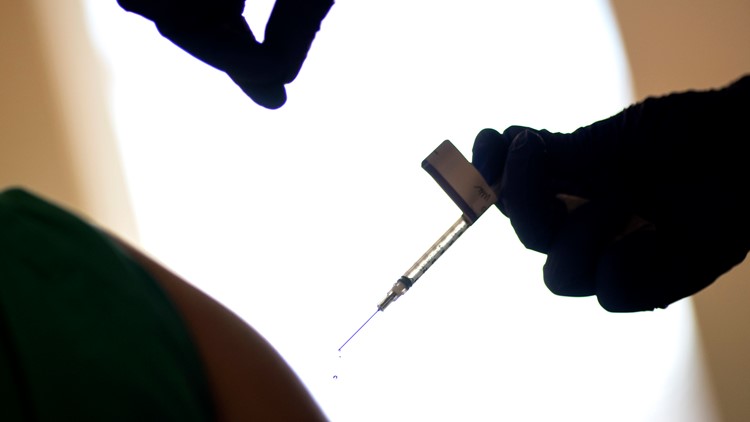PORTLAND, Maine — Massachusetts plans to offer the COVID-19 vaccine to tens of thousands of inmates, The New York Times reports. Now, the ACLU of Maine is calling on the state to follow suit.
In a letter sent to the Maine Department of Health and Human Services (DHHS) and the Maine Center for Disease Control (CDC) on Monday, the ACLU argues that incarcerated people, immigration detainees, and prison and jail staff should be included in Phase 1 of the vaccine distribution plan.
According to the Maine CDC, at least 13,000 doses of the vaccines (Pfizer and Moderna) have been delivered to the state so far. Half of those are going to long-term care facilities.
More shipments of Moderna's vaccine arrived at hospitals and were in some cases administered Tuesday.
In Maine’s phased plan, high-risk health care workers and first responders are the first that are being vaccinated, followed by people with high-risk medical conditions and Maine’s population who live in congregate care settings, as well as their workers.
In the second phase of the plan, critical care workers who are in essential industries and at high risk of exposure, as well as people with conditions that put them at moderate risk and all older adults not vaccinated in phase one will be vaccinated.
While the state’s initial plan included people in correctional settings in phase two of the plan, ACLU of Maine says the state has not yet decided whether to include incarcerated people in the first phase of the vaccine plan, which they say Maine CDC Director Dr. Nirav Shah told the Permanent Commission on the Status of Racial, Indigenous and Maine Tribal Populations on Dec. 16.
A state spokesperson said the current plan is "evolving."
"Maine is committed to safely and efficiently vaccinating all Maine residents as quickly as possible, guided by a plan for accessible, flexible and equitable distribution of the COVID-19 vaccine," Maine DHHS spokesperson Jackie Farwell told NEWS CENTER Maine Monday. "As noted, Dr. Shah recently spoke to the Permanent Commission about this plan, which recognizes that COVID-19 has not affected all groups in Maine equally. Maine’s vaccination plan continues to evolve, as expected since the draft plan was released in mid-October, in response to new guidance and information from the U.S. CDC and Operation Warp Speed."
Farwell said, "The health needs of Maine people who are disproportionately affected by the pandemic, including individuals in correctional settings, are part of this planning moving forward."
Maine CDC Director Dr. Nirav Shah last addressed the issue in a press briefing Friday.
"We are just laser-focused on getting vaccine out to hospitals," he said. "That's really where we're spending much our focus right now, but we recognize there are these very good and thoughtful questions out there."
Several other states have placed a higher priority on correctional facilities, including Massachusetts, where inmates will be some of the first to get the vaccine after health care workers and other frontline workers such as emergency medical workers and residents of long-term care facilities.
“We used equity as a core principle in our recommendations,” Dr. Simone Wildes, an infectious disease specialist and a member of Massachusetts’ COVID-19 vaccine advisory group said. “We have had a lot of cases of COVID in the prisons, and we wanted to make sure those at highest risk were getting the vaccine first.”
Prisons have had some of the country's biggest coronavirus outbreaks. More than one in 10 inmates around the country is over age 55 and therefore more vulnerable to the virus, said Lauren Brinkley-Rubinstein, co-founder of the COVID Prison Project. Inmates also have higher rates of chronic medical conditions that increase the risk of severe illness if they become infected, the New York Times reported.
“Those at greatest need — we have to take care of them,” Dr. Wildes said. “You can’t socially distance in prison.”
In its letter, the ACLU of Maine argues that in Maine, incarcerated people have an infection rate that is nearly 500 percent higher than the state’s overall infection rate, according to The Marshall Project, which tracked COVID-19 in prisons state-by-state.
Maine saw outbreaks in correctional facilities throughout the pandemic, including at the York County Jail, where there were at least 82 cases among inmates, staff, and family of staff. The outbreak was closed in late October.
“Maine has a moral and legal obligation to provide adequate health care to people who are incarcerated, which includes ensuring that they are vaccinated against COVID-19,” Sway said. “They live in crowded facilities where social distancing is not possible, and many incarcerated people are medically vulnerable. They face a greater risk of exposure to COVID-19.”
“We ask you to join the growing consensus among many states and health care experts to prioritize jails and prisons in Phase 1, or at the very least, treat incarcerated people ‘with comorbid and underlying conditions that put them at significantly higher risk’ the same as all other people with these conditions,” Meagan Sway, policy director of the ACLU of Maine, says in the letter. “In this way, we can help keep people who live and work inside those facilities safe, and also protect our larger community, where correctional workers return every day.”
“We recognize that vaccine allocation and distribution will present a tremendous challenge to state officials, who must balance a number of different public health, practical, and political considerations with the fact that the immediate supply of available vaccines will be severely limited,” Sway said. “Maine must, however, heed its moral and legal obligations to make these decisions based on the public health evidence, prioritizing access for those communities that have been disproportionately affected by the disease. This necessarily includes people who live and work in jails and prisons.”
The ACLU of Maine says they have not yet heard a response to their letter.



